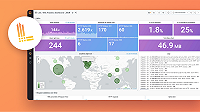Important: This documentation is about an older version. It's relevant only to the release noted, many of the features and functions have been updated or replaced. Please view the current version.
Experimental
otelcol.processor.deltatocumulative
EXPERIMENTAL: This is an experimental component. Experimental components are subject to frequent breaking changes, and may be removed with no equivalent replacement. The
stability.levelflag must be set toexperimentalto use the component.
otelcol.processor.deltatocumulative accepts metrics from other otelcol components and converts metrics with the delta temporality to cumulative.
Note
otelcol.processor.deltatocumulativeis a wrapper over the upstream OpenTelemetry Collectordeltatocumulativeprocessor. Bug reports or feature requests will be redirected to the upstream repository, if necessary.
You can specify multiple otelcol.processor.deltatocumulative components by giving them different labels.
Usage
otelcol.processor.deltatocumulative "LABEL" {
output {
metrics = [...]
}
}Arguments
otelcol.processor.deltatocumulative supports the following arguments:
otelcol.processor.deltatocumulative tracks incoming metric streams.
Sum and exponential histogram metrics with delta temporality are tracked and converted into cumulative temporality.
If a new sample hasn’t been received since the duration specified by max_stale, tracked streams are considered stale and dropped. max_stale must be set to a duration greater than "0s".
The max_streams attribute configures the upper limit of streams to track.
If the limit of tracked streams is reached, new incoming streams are dropped.
You can disable this behavior by setting max_streams to 0.
Blocks
The following blocks are supported inside the definition of otelcol.processor.deltatocumulative:
output block
The output block configures a set of components to forward resulting telemetry data to.
The following arguments are supported:
You must specify the output block, but all its arguments are optional.
By default, telemetry data is dropped.
Configure the metrics, logs, and traces arguments accordingly to send telemetry data to other components.
debug_metrics block
The debug_metrics block configures the metrics that this component generates to monitor its state.
The following arguments are supported:
disable_high_cardinality_metrics is the Grafana Alloy equivalent to the telemetry.disableHighCardinalityMetrics feature gate in the OpenTelemetry Collector.
It removes attributes that could cause high cardinality metrics.
For example, attributes with IP addresses and port numbers in metrics about HTTP and gRPC connections are removed.
Note
If configured,
disable_high_cardinality_metricsonly applies tootelcol.exporter.*andotelcol.receiver.*components.
level is the Alloy equivalent to the telemetry.metrics.level feature gate in the OpenTelemetry Collector.
Possible values are "none", "basic", "normal" and "detailed".
Exported fields
The following fields are exported and can be referenced by other components:
input accepts otelcol.Consumer data for metrics.
Component health
otelcol.processor.deltatocumulative is only reported as unhealthy if given an invalid configuration.
Debug information
otelcol.processor.deltatocumulative does not expose any component-specific debug information.
Debug metrics
otelcol_deltatocumulative_streams_tracked(gauge): Number of streams currently tracked by the aggregation state.otelcol_deltatocumulative_streams_limit(gauge): Upper limit of tracked streams.otelcol_deltatocumulative_streams_evicted(counter): Total number of streams removed from tracking to ingest newer streams.otelcol_deltatocumulative_streams_max_stale_seconds(gauge): Duration without new samples after which streams are dropped.otelcol_deltatocumulative_datapoints_processed(counter): Total number of datapoints processed (successfully or unsuccessfully).otelcol_deltatocumulative_datapoints_dropped(counter): Faulty datapoints that were dropped due to the reason given in thereasonlabel.otelcol_deltatocumulative_gaps_length(counter): Total length of all gaps in the streams, such as being due to lost in transit.
Examples
Basic usage
This example converts delta temporality metrics to cumulative before sending it to otelcol.exporter.otlp for further processing:
otelcol.processor.deltatocumulative "default" {
output {
metrics = [otelcol.exporter.otlp.production.input]
}
}
otelcol.exporter.otlp "production" {
client {
endpoint = sys.env("OTLP_SERVER_ENDPOINT")
}
}Exporting Prometheus data
This example converts delta temporality metrics to cumulative metrics before it is converted to Prometheus data, which requires cumulative temporality:
otelcol.processor.deltatocumulative "default" {
output {
metrics = [otelcol.exporter.prometheus.default.input]
}
}
otelcol.exporter.prometheus "default" {
forward_to = [prometheus.remote_write.default.receiver]
}
prometheus.remote_write "default" {
endpoint {
url = sys.env("PROMETHEUS_SERVER_URL")
}
}Compatible components
otelcol.processor.deltatocumulative can accept arguments from the following components:
- Components that export OpenTelemetry
otelcol.Consumer
otelcol.processor.deltatocumulative has exports that can be consumed by the following components:
- Components that consume OpenTelemetry
otelcol.Consumer
Note
Connecting some components may not be sensible or components may require further configuration to make the connection work correctly. Refer to the linked documentation for more details.



